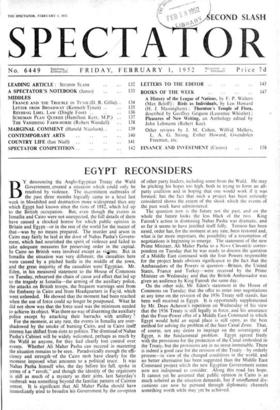EGYPT RECONSIDERS
• went unheeded. He showed that the moment had been reached when the use of force could up longer be postponed. What he did not show was that the force used was the minimum needed to achieve its object. Was there no way of disarming the auxiliary police except by attacking their barracks with artillery ? For the moment, at any rate, the events in Ismailia are over- shadowed by the smoke of burning Cairo, and in Cairo itself interest has shifted from riots to politics. The dismissal of Nahas Pasha's Cabinet will be widely welcomed, perhaps as much by the Wafd as anyone, for they had clearly lost control over events. Whether Ali Maher Pasha can succeed in mastering the situation remains to be seen. Paradoxically enough the effi- ciency and strength -of the Cairo mob have clearly for the moment impbsed what amounts to a political truce. It was Nahas Pasha himself who, the day before his fall, spoke in terms of a "revolt," and though the identity of the organisers is still as much of a mystery as their aims, last Saturday's outbreak was something beyond the familiar pattern of Cairene unrest. It is significant that Ali Maher Pasha should have immediately tried to broaden his Government by the co-option of other party leaders, including some from the Ward. He may be pitching his hopes too high, both in trying to form an all- party coalition and in hoping that one would work if it was formed; but the fact that such a project has been seriously considered shows the extent of the shock which the events of the past week have administered.
The question now is the future not the past, and on the whole the future looks the less black of the two. King Farouk's action in dismissing Nahas Pasha was dramatic, and so far it seems to have justified itself fully. Tension has been eased, order has, for the moment at any rate, been restored and, what is far more important, the possibility of a resumption of negotiations is beginning to emerge. The statement of the new Prime Minister, Ali Maher Pasha to a News Chronicle corres- pondent on Tuesday that he was ready to discuss the question of a Middle East command with the four Powers responsible for the project lends obvious significance to the fact that the Ambassadors of the Powers in question—Britain, the United States, France and Turkey—were received by the Prime Minister on Wednesday and that the British Ambassador was given an audience by King Farouk the same day. On the other side, Mr. Eden's statement in the House of Commons on Tuesday that the offer to enter into negotiations at any time on the revision of the 1936 Treaty still stands, has been well received in Egypt. It is opportunely supplemented by Mr. Dean Acheson's repetition on Wednesday of his view that the 1936 Treaty is still legally in force, and his assurance that the Four-Power offer of a Middle East Command in which Egypt would hold an equal place is still open, as the best method for solving the problem of the Suez Canal Zone. That, of course, not any desire to impinge on the sovereignty of Egypt, is the fundamental problem. Egypt agreed freely with the provisions for the protection of the Canal embodied in the Treaty, but the provisions are in no sense immutable. There is indeed a good case for The revision of the Treaty—by orderly process—in view of the changed conditions in the world, and no better alternative has been suggested than the Middle East Command project which the new Egyptian Government seems now not indisposed to consider. Along this road lies hope. It cannot yet be assumed that public opinion in Cairo is as much sobered as the situation demands, but if uninflamed dis- cussions can now be pursued through diplomatic channels something worth while may yet be achieved.


































